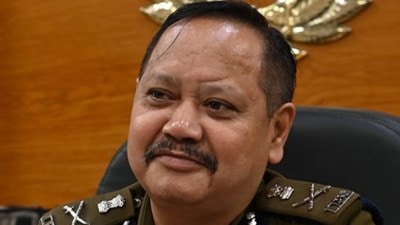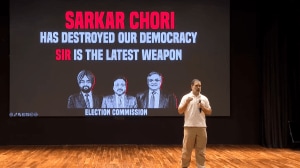The Untold Story
There are two wars being fought in Iraq. The first is the dramatic 24-hour reality show called ‘‘Operation Iraqi Freedom’...

There are two wars being fought in Iraq. The first is the dramatic 24-hour reality show called ‘‘Operation Iraqi Freedom’’. In this war, the reality of this reality show is determined by a simple but effective adage: ‘‘your access is dependent on the troops you have on the ground’’. This is what Colonel Chris Vernon, spokesman for the British land forces told a German reporter in response to a question that questioned the biased handling of the international press by the Coalition Forces. The other war is the battle being fought in the shadows, where there are neither embedded reporters nor independent journalists.
A group of journalists who tried to go towards Umm Qasr recently, after visiting the Rumialla oil fields in Southern Iraq were fired upon by Kuwaiti border guards. ‘‘We strongly discourage you to enter Southern Iraq unescorted,’’ is the stern warning given by the press officers at the press desk at the Coalition Press Information Centre. ‘‘This is for your safety,’’ they add. But if Umm Qasr is totally under the control of the British forces and most of Southern Iraq under the control of the Coalition Forces, why is access being restricted? Why is it still not safe to visit Southern Iraq? If the war has ‘‘progressed well’’ why is most of Iraq still unsafe?
The only urban centre in Southern Iraq where the coalition forces have established a modicum of control is Umm Qasr. None of the other cities in Southern Iraq is under the Coalition Forces. All that they have done is lay siege to the urban centres or established a dominating presence, like in Al Nasriyah.
With the humanitarian situation deteriorating inside urban centres, the Coalition Forces do not want largescale scrutiny of their operations by the international press.
The American and British forces are already hard pressed with mounting civilian casualties. Clearly, they do not want to take more flak for the humanitarian impact of war. Therefore, the restricted access to Southern Iraq.
In fact, even the international relief organisations are not allowed to take journalists with them to cover their relief efforts. So far only Red Cross has managed to get aid into Basra, specially medical supplies.
‘‘A team of journalists who accompanied our convoy were turned away from a checkpoint,’’ said Tamara Ali Rifai, ICRC spokesperson. Even the international relief NGOs waiting in Kuwait to set up operations in Southern Iraq have been only allowed to work in Umm Qasr.
Therefore, except for Umm Qasr, the entire Southern Iraq belt is still under nominal control of the Coalition Forces. Obviously, there cannot be any other reason why even after 19 days of the war the Americans and British have not been able to establish a dominant control.
This has, in effect, aggravated the humanitarian crisis in Southern Iraq. Clearly there are no surprises here. The Coalition Forces have aggravated the humanitarian crisis and the war has resulted in thousands of civilian casualties and there are not enough medical supplies.
‘‘Southern Iraq is in need of urgent medical supplies,’’ said Al Rifai. Obviously, all these don’t contribute to pretty images and inspired war reporting. It is understandable, therefore, why the Americans and British don’t want the prying eyes of the international press in Southern Iraq.
The American and the British press have privileged access because, after all, it’s their war. Remember the quote: ‘‘your access is dependent on the troops you have on the ground’’. So, even though the British and American media are taken to Umm Qasr and to the outskirts of Basra, they report on how the British troops are organising humanitarian relief. They are not doing stories about the sufferings of the Iraqis. They are not trying to answer questions like: Why suddenly, three days after the war began on March 20, potable water ran out in Southern Iraq? Why people who had foodstocks that would last them till the end of April were suddenly facing imminent starvation?
Why some Iraqis are selling foodstocks? Why there is such a shortage of medical supplies when the ICRC has been screaming from rooftops everyday about the urgent need for largescale life-saving medical supplies?
The war being fought in the shadows is the war that will perhaps never be reported. The dramatic war unfolding on television and the extensive curbing of the media’s functioning on the ground has ensured that the Americans and British have succeeded in mounting a sophisticated and complex public relations exercise.
The only access to Southern Iraq is through Kuwait. In Kuwait, the Coalition officers basically act like those graduates working in call centres in India. They take calls, are patient, answer queries with ‘‘there is nothing on that yet’’ or ‘‘you will have to keep calling to find out’’.
There are approximately 2,000 international mediapersons in Kuwait. The Coalition’s military planners have out-thought each and every opportunity that journalists may take recourse to in order to get inside Southern Iraq.
They have forbidden relief agencies to take journalists with them. Series of Kuwaiti checkposts before the borders and the American and British forces in the border ensure that there is no way that a journalist can get in. That leaves only option — getting into Southern Iraq under the escort of American or British forces. In nine out of ten cases, the composition of such ‘‘day trips’’ are as follows in the order of preference: the highest quota is for American and British journalists, followed by journalists from the host country (Kuwait) and friendly Arab countries, followed by journalists from European countries supporting the war. The few extras are journalists from other countries who are selected by a system of rotation.
So, on the one hand ‘‘embedded journalism’’ has allowed the Coalition Forces to project Operation Iraqi Freedom as a techno-savvy war. It has enabled the Americans and British to project this war as a war with a conscience. No wonder the laboured protestations about how each bombing campaign endeavours to minimise civilian casualties by the use of precision weapons.
On the other hand, ‘‘restricted media access’’ on the ground and from the rear has enabled the Coalition Forces to project a constant pace as far as the image of the war in Iraq is concerned. So even as the Coalition Forces ‘‘punch’’ their way forward, there is no media presence to cover the terrible human consequences of the battle left behind.



- 01
- 02
- 03
- 04
- 05




























